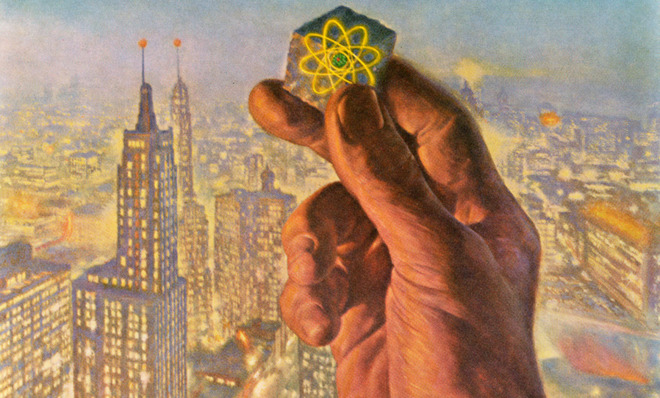Conservatives talk a big game on nuclear power. But it's a crock.
It's pretty simple: Nuclear costs money, and Republicans hate spending it


A free daily email with the biggest news stories of the day – and the best features from TheWeek.com
You are now subscribed
Your newsletter sign-up was successful
Conservatives have seemingly had a long-standing love affair with nuclear energy. It was a major plank of John McCain's energy plan during his 2008 run for president, and he continues to support it. But the reality is that Republican support for nuclear energy is about a quarter-inch deep. They aren't willing to pony up the cash for a serious push on nuclear, which means their enthusiasm will always remain merely rhetorical.
Ideologically speaking, nuclear has always been a strange preference for the GOP. Nuclear is dependent on massive government subsidies, which is typically the kiss of death for conservatives (except for when it comes to the oil and gas industry, natch).
However, as France has shown, if you can stomach the stupendous government spending, nuclear does have the potential to replace nearly all traditional carbon power. Such an outcome would probably be vastly more expensive than simply investing in renewables, but it could work, satisfying American energy demands and eliminating emissions — a win for both liberals and conservatives.
The Week
Escape your echo chamber. Get the facts behind the news, plus analysis from multiple perspectives.

Sign up for The Week's Free Newsletters
From our morning news briefing to a weekly Good News Newsletter, get the best of The Week delivered directly to your inbox.
From our morning news briefing to a weekly Good News Newsletter, get the best of The Week delivered directly to your inbox.
Thus the Breakthrough Institute, which appears to exist solely to troll environmentalists, claims that the Right has historically done far more than the Left to counteract climate change. The argument is that since solar and wind have only very recently become cost-competitive, fracking and nuclear since 1950 have emitted less CO2 than renewables.
Now, that's kind of like saying if you add up all the arithmetic performed since 3000 B.C., then abacuses have far more computing power than an iPhone. And like every Breakthrough analysis, the argument fails on lousy political presumptions — namely, that conservatives support nuclear power in the first place.
Why is nuclear so dependent on government? In a nutshell, nuclear plants are stupendously complex feats of engineering (always a struggle for America) that house radioactive materials. They are terrifically expensive to build, insure, maintain, and decommission, and government is about the only institution large enough to backstop the cost.
In France, the government just builds and runs the plants itself, but the U.S. tends to prefer loan guarantees. There are two new nuclear plants on deck right now, and while one is being built without federal help, the other is getting billions in loan guarantees from the Department of Energy.
A free daily email with the biggest news stories of the day – and the best features from TheWeek.com
Leaving aside the one plant that is going it alone, it's fair to say that a big new nuclear push would require hundreds of billions in guarantees at least. And given the industry's absolutely abysmal record of cost overruns and abandonment, it will probably entail a lot of spending, too.
Now, as T.A. Frank has demonstrated, historically Republicans have actually been willing to spend the money on nuclear. But today's conservatives are far more hard-line about government spending. Paul Ryan, the closest thing the GOP has to a policy leader, released his latest budget blueprint in April, and it zeroed out the Department of Energy nuclear loan guarantee program, with barely any protest from fellow Republicans.
I think this reveals that the conservative love of nuclear is driven primarily by animosity toward renewables and the perception that the greens don't like it. But it turns out that conservatives hate government spending a lot more than they like pissing off the hippies. (Indeed, as John Aziz has noted, in many ways solar is the perfect individualist energy source for today's reactionaries.)
The bottom line is that if Republicans don't consider nuclear an important enough priority to spend money on, then their so-called support is useless.
Ryan Cooper is a national correspondent at TheWeek.com. His work has appeared in the Washington Monthly, The New Republic, and the Washington Post.
